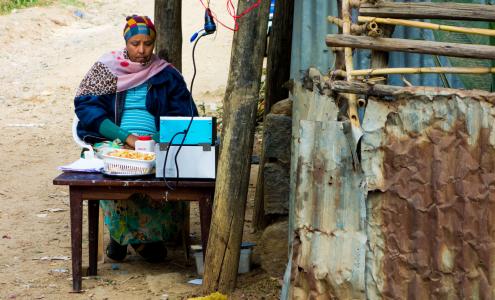
Project Details

Abebe Damte Beyene
Impacts and drivers of policies for electricity access
Micro- and macro-economic analysis of Ethiopia's tariff reform
Background, challenges and context
While the Ethiopian government has started to make major investments in the power sector, many of the country’s homes and businesses still lack access to sufficient power supplies for carrying out productive uses, or even for basic services like lighting. Reliable and consistent access to electricity is another major challenge, with even those connected to the grid experiencing frequent scheduled and unscheduled power interruptions.
Low access rates and lack of quality of service are directly and indirectly related to financial challenges in the Ethiopian power sector. Electricity infrastructure projects require substantial amounts of capital, and maintenance and replacement activities depend on power companies having stable cash flow. Revenue collected from the sale of electricity can be used for these activities, but current tariffs in Ethiopia are among the lowest in Africa, and are far below the cost of electricity generation. According to information from the Ethiopian Electric Utility (EEU), the existing electric power generation, transmission, and distribution costs are, on average, about $0.09 per kilowatt-hour (kWh), while the current tariff for electricity lies between $0.04 and $0.06 per kWh.
Low prevailing electricity tariffs have saddled the country with large debts, threaten the credit worthiness of government-owned power companies, and drag down the national budget.
Recognising this problem, the Ethiopian government is revising the existing tariff rate structure to achieve cost recovery and help incentivise private sector participation in the power market, which is currently non-existent. The tariff reform involves a minor price increase for the first 12 months, followed by a steeper increase for the following 36 months. Customers consuming fewer than 50kWh of electricity per month (probably low-income households with low electricity needs) will experience no change in electricity prices. Households or firms that consume more electricity will experience higher costs of electricity per kWh.
Complementary policy measures are also being considered to encourage households and enterprises to engage in energy efficiency and conservation activities.
Research overview and objectives
The main focus of this research project will be micro- and macro-level analysis of the tariff reform, with the team evaluating the impacts of the first phase on the demand for electricity among household and commercial consumers, as well as on the broader economy.
However, poor reliability and access to electricity cannot be improved through better-designed tariffs alone. Therefore, the project will also investigate whether energy audit programmes (which will provide information on the quantity of electricity consumed and offer suggestions for conserving electricity) encourage conservation practices and enhance the productive use of electricity in commercial enterprises. An experimental side-study on the impacts of smart meters and energy audits on commercial electricity demand may also be implemented, depending on timing.
The team will also study the effect of prepaid metering on household electricity use. Prepaid meters are thought to reduce consumption, and improve revenue collection for power companies.
Additionally, the team will also investigate the barriers and opportunities for private sector participation in the power market via tariffs/pricing reform and other policy mechanisms.
The approaches being taken range from experimental randomised control trials and quantitative modelling of both longitudinal and cross-sectional survey data to qualitative analysis. The team has extensive research experience in Ethiopia, and will use several existing datasets, including the Household Electricity and Water Consumption survey, the Micro, Small, and Medium Enterprises survey, and a prior willingness to pay survey. A follow-up survey of both household and firm level data will also be conducted.
It is believed the project will fill important knowledge gaps on the role that electricity pricing reform can play in influencing energy consumption and improving electricity service delivery. The findings are expected to inform interventions that would enhance the government’s efforts to expand access to electricity, address inefficiency in energy consumption, and contribute to the socioeconomic development of the country. In addition, it is anticipated that the project will contribute to the capacity building of Ministry of Water, Irrigation and Energy (MoWIE) staff, and students from Addis Ababa University and Duke University as well.
Partners
Addis Ababa University (AAU)
Ministry of Water, Irrigation and Energy (MoWIE)
Ethiopian Electric Utility (EEU)
Duke University, Sustainable Energy Transitions Initiative (SETI)
University College Dublin, School of Economics and Energy Institute
University College London, Science, Technology, Engineering and Public Policy (STEaPP)
World Bank
